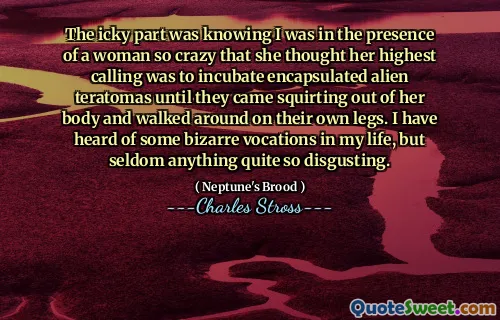In "Neptune's Brood," an ambitious science fiction novel by Charles Stross, the story is set in a distant future where human life has evolved in surprising ways. The narrative follows the journey of Krina Alizond, a progeny of a long-extinct human civilization, as she navigates through a universe shaped by advanced technologies and economic systems. Stross intricately explores themes of capitalism, banking, and evolution, set against a backdrop of interstellar travel and life forms that challenge our understanding of sentience.
The plot thickens as Krina searches for her missing sibling, using her unique abilities to traverse the galactic landscape. The narrative is layered with rich world-building, incorporating elements like slower-than-light travel, which reflects Stross's creative take on the consequences of applied physics in a futuristic setting. As she encounters various species and factions, the story delves into moral dilemmas and the complexities of life in outer space, making readers question the nature of consciousness and economic survival.
More »
Today Birthdays
1729 -
Edmund Burke
1949 -
Haruki Murakami
1954 -
Howard Stern
1876 -
Jack London
1993 -
Zayn Malik
1951 -
Kirstie Alley
1863 -
Swami Vivekananda
1923 -
Alice Miller
1987 -
Naya Rivera
1825 -
Brooke Foss Westcott
1944 -
Joe Frazier
1951 -
Rush Limbaugh
1964 -
Jeff Bezos
1978 -
Jeremy Camp
1628 -
Charles Perrault
1856 -
John Singer Sargent
1970 -
Kaja Foglio
1953 -
Rick Santelli
1986 -
Gemma Arterton
1968 -
Raf Simons
1958 -
Christiane Amanpour
1966 -
Olivier Martinez
1996 -
Ella Henderson
1917 -
Maharishi Mahesh Yogi
1949 -
Ottmar Hitzfeld
1928 -
Ruth Brown
1968 -
Heather Mills
1946 -
George Duke
1968 -
Rachael Harris
1923 -
Ira Hayes
